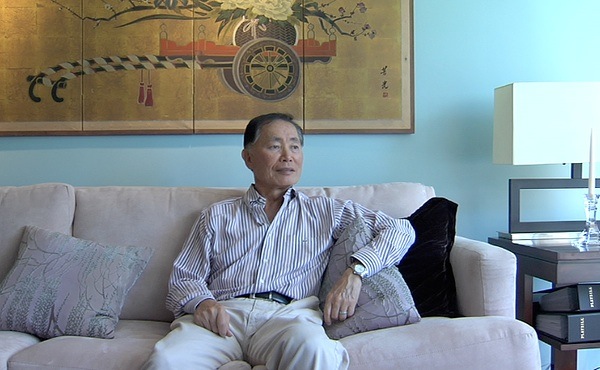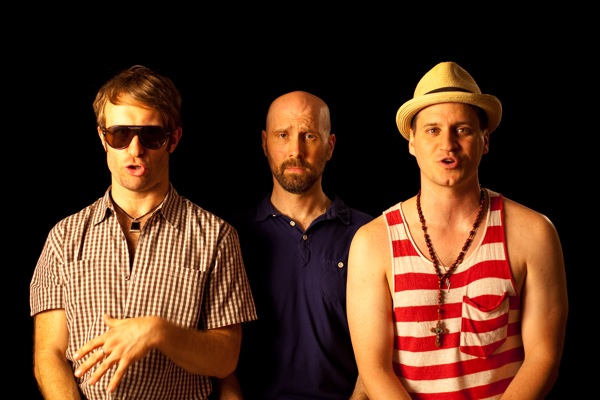
Why do some gay men sound so … well, gay? And what causes this? How do men with a “gay voice” feel about this revealing clue to their identity? And is it possible for some men to sound gay but actually be straight?
In Do I Sound Gay? journalist turned filmmaker David Thorpe explores this linguistically and culturally rich phenomenon by documenting his funny, moving, and ultimately empowering quest to come to terms with the anxiety brought on by his tonal quality. After seeking answers from friends, family members, vocal coaches, linguists, random people on the street, and celebrity interviewees including author David Sedaris, comedian Margaret Cho, newscaster Don Lemon, activist Dan Savage, and actor George Takei, Thorpe realizes his problem goes beyond mere sonancy — he’s never fully dealt with his own internal homophobia.
Thorpe spoke to Palm Springs Life about filmmaking, struggling with insecurity, and what he learned about his gay voice. Do I Sound Gay? screens July 24 at Cinemas Palme d’Or in Palm Desert.

Director David Thorpe seeks advice from vocal coaches, linguists, historians, friends, strangers, celebrities and others in order to better understand his voice. "Where does my 'gay voice' come from?" he asks.
How did you make the leap from journalism to filmmaking?
As a journalist, I did a fair amount of first-person writing. For example, I wrote a piece for New York magazine where I wore a wig because I was starting to not like being bald as I got older. I wore a wig to see if that would make me happier, and I wrote about it. Do I Sound Gay? is similar project in that I wondered if changing my voice would make me happier. And making a film seemed like the fastest and easiest way to get there.
Were there any specific journalistic skills that proved especially helpful to you?
Sure. First and foremost, I didn’t have a lot of fear about asking well-known people to participate. I had done that many times, and I knew the worst thing that could happen is they would say no.
Did anyone say no?
Yes. I reached out to two very well-known television actors who declined, saying they hadn’t really thought about it and that they didn’t sound gay. Inside I wanted to say, “Well, I think you should think about it. A lot of people perceive you that way.” I only say that in a fun, anecdotal way. I don’t hold it against them. I couldn’t expect everybody to say yes.

George Takei: “I was put in a prison camp for how I looked. Democracy can fail when we subscribe to stereotypes.”
In the film, David Sedaris says, “I’m embarrassed to say this but sometimes somebody will say, ‘I didn’t know you were gay.’ Why does that make me feel good? I hate myself for thinking that.” In a way, that summed up the movie for me. Do you think we’ll ever get to a point when being gay — or the degrees to which one’s gayness is apparent — is no longer a conversation piece?
Yes and no. I think in some places we’re already there. On the other hand, what you’re talking about is really a utopian society in which, regardless of our differences, we accept each other without a beat. That seems like a wonderful thing to aspire to, and if we get there, great — but I think all we can do is fight to get there.
How quickly did the film’s title come to you?
Almost immediately. The phrase that something “sounds gay” is a slur I grew up with. It’s still very much a part of our culture. It was a question that was on my mind, and it immediately captured the anxiety that the film is meant to explore.
What did you find to be the most challenging aspect of this project?
It’s hard to pick one. Making a film takes years and a lot of logistical obstacles. But for me, this was a personal journey first and a film second. What you see in the film where I’m really struggling and feeling lonely and not good about myself — it’s all real. That stuff was not easy to go through.

David Thorpe (center) sorts through his feelings in this fantasy sequence.
In the film you talk a lot about your insecurities, especially when it comes to your voice, but in your quest for answers I actually found you to be quite ballsy.
Sometimes you have to rush into something without thinking about it. In the film, I depict the lightning-bulb moment where I realize that after 25 years of being out of the closet I’m still not comfortable sounding gay and that I can still feel alienated when other gay men are being queeny. I needed to come to terms with that. I didn’t know where I would end up — I just knew I had to move forward.
Were you surprised to learn that your friends had similar concerns about their voices?
I was truly astonished to learn how many gay men identified with my anxiety — and especially astonished that two of my best friends have anxiety and lingering shame about being gay.
You say in the beginning that the idea for the film came after a breakup. I’m curious: Has your newfound celebrity improved your dating life?
I’m still single. But I feel much more confident and much more able to be approached and approach people that I’m interested in because I feel better about myself.
After all is said and done, how do feel about your gay voice now?
I’ve learned that there’s no such thing as a gay voice. The phrase “gay voice” is shorthand for the stereotype of a voice that’s more feminine. But there’s no voice limited to gay men. The film is a celebration of gay voices but also a celebration of all voices and really understanding that voices are as individual as the people who have them.
Do I Sound Gay? Screens July 24 at Cinemas Palme d’Or, 72840 Highway 11, Palm Desert, 760-779-0730; www.thepalme.com
Like what you're reading? Then "Like" us on Facebook and "follow" us on Twitter.